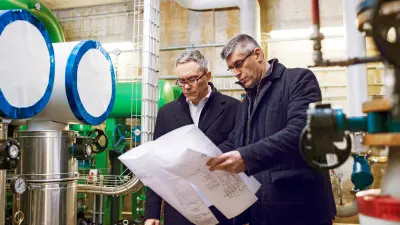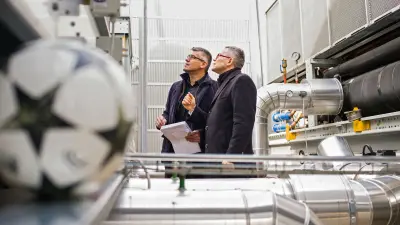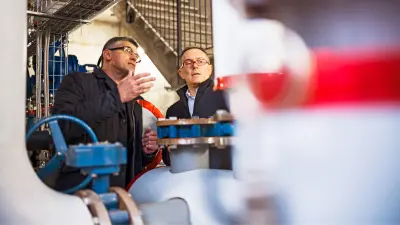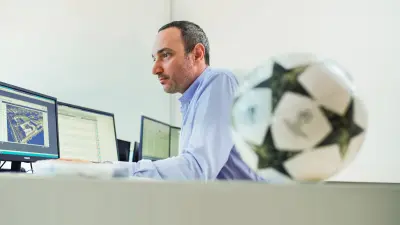Energy for Juventus
Bosch is turning up the heat for Italy’s most successful soccer team — with highly efficient building-services technology
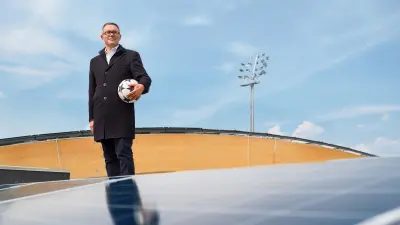
A technically perfect one-two combination: J-Village is the new home of the storied Italian soccer team Juventus, or “Juve” as its fans call it. The new facility in the team’s home city of Turin is equipped with an integrated central heating and cooling system. Thanks to intelligent technology, the system is very efficient. The creative playmaker for planning, financing, and realization is Bosch.
The new J-Village: the aura of “la Vecchia Signora”
Alberto Bollea has long grown very fond of “his” urban complex. As the project manager for J-Village, he played a key role in bringing this innovative 159,813-square-meter complex in the middle of Turin to life. Construction of the site was made possible by the intervention of different investors through a real estate fund. Among other things, the site encompasses a four-star hotel with 138 rooms, an international school (including the Juventus College) for 600 students, and a concept store comprising a kind of event center for e-sports and offering all the paraphernalia a devoted Juventus fan could ever wish for. The complex is steeped in the aura of a legendary soccer club. Juventus, the “old lady” of Italian soccer, has combined a chic club headquarters and a new training center on this site. “It’s an unrivaled complex, right next to the Juventus stadium – a space where sports and business can come together,” Bollea says proudly.
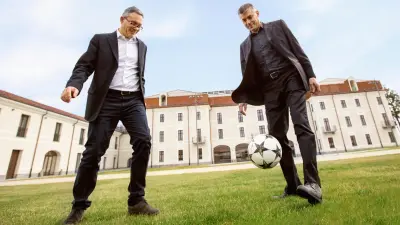
Many tasks, one team: Bosch
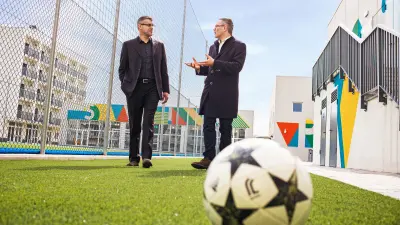
In J-Village, everyone has their sights set on success. While the dream for Juventus is major titles, the hotel and the concept store hope to make an economic success of their affiliation with Juve. It’s a mix of emotion and cool reasoning. On the numbers side, energy supply plays a significant role. After all, 34,830-square-meter need to heated and cooled properly. “When it comes to making J-Village a success,” Bollea says, “Bosch is an important part of the team.” In its bid for the energy-supply contract, Bosch offered a complete suite of solutions instead of individual products. Neither the investors nor Juventus wanted to have to work with a variety of different specialists, so they opted instead for just one partner that offered everything the different buildings needed from a single source. In other words, they opted for Bosch. This wasn’t just about planning and constructing the complex system, but about operating it in the future as well.
Angelo Paisio, chief construction engineer at Bosch Energy and Building Solutions Italy, learned something new in the course of this collaboration: in the world of soccer, speed is the name of the game. “The biggest challenge was planning and building this large heating system in just one year. We had to install two kilometers of underground piping alone,” Paisio says.
“To supply our customers with heating and cooling energy, we sell solutions, not products. We offer planning, financing, services, and implementation from a single source.”
Site plan of the J-Village in Turin
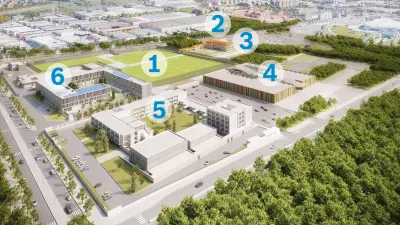
Directly adjoining the Juventus stadium: J-Village with the Juventus training center (1), Juventus headquarters Villa Continassa (2), the Bosch mechanical room (3), a concept store (4), International school including the Juventus College (5), and a four-star hotel (6)
The mechanical room
The heating plant at J-Village is the largest of its kind that Bosch has ever built in Italy. It cost 2.5 million euros. “Of course, a complex system like this for such a popular customer is also a matter of prestige,” Angelo Paisio says. The on-site Bosch mechanical room houses the highly efficient, integrated systems – most importantly, a combined heat and power (CHP) generation plant, electric heat pumps for hot and cold water, heat exchangers, and pump systems for heat-transfer fluids. This centralized closed-loop system
is connected to Turin’s district-heating network, allowing users to access energy on demand. In addition, smart connectivity means all the pieces of equipment are monitored and controlled. “Powered by natural gas, the CHP plant produces enough heat to meet basic requirements and most of the power we need for the entire complex,” Paisio says. This is another reason why the energy supply for the complex is so efficient.
-
The source of the energy for the individual buildings -
Alberto Bollea and Angelo Paisio deep inside the mechanical room -
Cool stuff: Angelo Paisio shows Alberto Bollea the cooling system
13.9 MWth
is the heat output generated by the system for J-Village. Its cooling capacity is 3.2 megawatts.
Exciting prospects
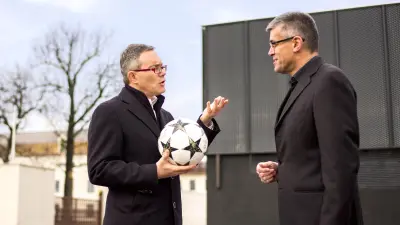
When the energy-supply equipment went into operation, the whistle blew to mark the end of the first phase of Bosch’s collaboration with Italian soccer’s most successful team. The plant is up and running, and its pumps and generators are hard at work in the mechanical room. But this is just the beginning. Many more seasons lie ahead. The service agreement with Juventus stipulates that Bosch will monitor and maintain the plant for the next 15 years. In other words, it is entirely up to the company to supply J-Village with energy. “Bosch provides an outstanding and innovative suite of services. I have no doubt it’ll help make J-Village a success,” Alberto Bollea says.
Summary
By successfully completing the complex plant for Juventus’s J-Village, Bosch has underscored its role as an expert partner and provider of intelligent energy solutions for all challenges in the realm of energy supply and management.
